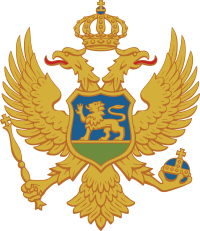Montenegrin parliamentary election, 2006
| | |||||||||||||||||||||||||||||||||||||||||||||||
| 10 December 2006 | |||||||||||||||||||||||||||||||||||||||||||||||
| |||||||||||||||||||||||||||||||||||||||||||||||
| This lists parties that won seats. See the complete results below. | |||||||||||||||||||||||||||||||||||||||||||||||
| |||||||||||||||||||||||||||||||||||||||||||||||
 |
| This article is part of a series on the politics and government of Montenegro |
| Constitution |
|
Executive |
|
Legislative
|
|
Judiciary
|
|
Constitutional Assembly elections were held in the newly independent Republic of Montenegro on 10 September 2006. Prime Minister Milo Đukanović's Coalition for a European Montenegro, at whose core was the Democratic Party of Socialists, won 39 seats (+1 Albanian) in the 81 seat parliament with the vote near fully counted. The opposition blocs together received 34 seats (11 for the Socialist People's Party and the Movement for Changes each and 12 for the Serbian List). There were 484,430 eligible voters.
As rival groups conceded defeat, the Đukanović stated that, "These elections showed that Montenegro is stable and firm on its road to Europe."[1] The new Movement for Changes, standing on a pro-EU, anti-corruption and economic improvement platform, took 11 seats. Other seats were won by parties representing ethnic minorities, mainly Albanians.
Electoral system
Of the 81 seats in Parliament, 76 were elected by proportional representation in a nationwide constituency and five were elected in a special constituency for the Albanian minority.[2] The electoral threshold was set at 3% and seats allocated using the d'Hondt method.[2] Closed lists were used with a single list for both constituencies, although parties only had to awawrd half their seats according to the order of the list, with the remaining half free for them to allocate.[2]
Campaign
The main campaign issues were the economy, unemployment, the environment and European integration.[3] The government campaigned on the recent successful independence referendum and international recognition of the country.[3] Opposition parties criticised the performance of state institutions, as well as criticising their politicisation, but suffered from internal divisions and the formation of new parties.[3]
Although the Đukanović government made a decision not to pay for parties' election campaigns using state funds, it eventually relented and funding was distributed equally between all parties.[3] However, the opposition claimed the amount distributed was too low.
Opinion polls
One opinion poll leading up to the elections suggested Đukanović's Democratic Party of Socialists (DPS) could win as much as 30%-45% of the vote, but that would still leave him needing a coalition partner. According to the same poll, the three pro-Serb opposition alliances could each win between 10% and 20% of the vote - potentially enough to unseat the Prime Minister if they succeed in uniting against him. All three claimed their main priority was to replace Đukanović. However, the Prime Minister himself did not rule out joining forces with the main opposition bloc, led by the Socialist People's Party.[4]
Results
| Party | Votes | % | Seats | +/– | ||
|---|---|---|---|---|---|---|
| Main | Albanian | Total | ||||
| Coalition for a European Montenegro (DPS–SDP) | 164,737 | 48.62 | 39 | 2 | 41 | +2 |
| Serb List | 49,730 | 14.68 | 12 | 0 | 12 | – |
| SNP–NS–DSS | 47,683 | 14.07 | 11 | 0 | 11 | – |
| Movement for Changes | 44,483 | 13.13 | 11 | 0 | 11 | New |
| Liberals and Bosniak Party | 12,748 | 3.76 | 3 | 0 | 3 | – |
| Democratic Alliance in Montenegro–Party of Democratic Prosperity | 4,373 | 1.29 | 0 | 1 | 1 | – |
| Democratic Union of Albanians | 3,693 | 1.09 | 0 | 1 | 1 | – |
| Civic List | 2,906 | 0.86 | 0 | 0 | 0 | – |
| Albanian Alternative | 2,656 | 0.78 | 0 | 1 | 1 | – |
| League of Communists of Yugoslavia – Communists of Montenegro | 2,343 | 0.69 | 0 | 0 | 0 | – |
| New Democratic Force - FORCA | 2,197 | 0.65 | 0 | 0 | 0 | – |
| Democratic Party of Montenegro | 1,286 | 0.38 | 0 | 0 | 0 | – |
| Invalid/blank votes | 6,922 | – | – | – | – | – |
| Total | 345,757 | 100 | 76 | 5 | 81 | +6 |
| Registered voters/turnout | 484,430 | 71.4 | – | – | – | – |
| Source: Nohlen & Stöver | ||||||